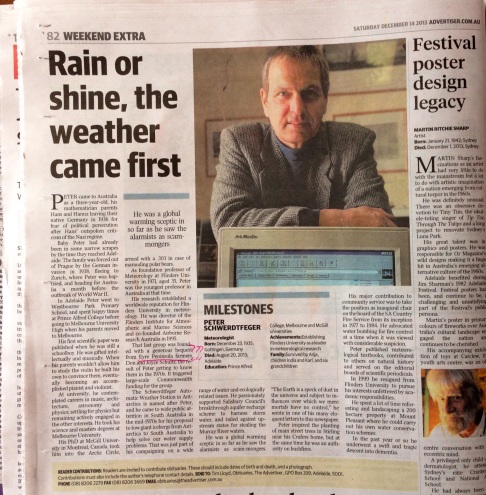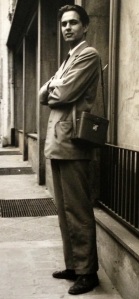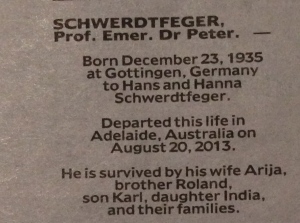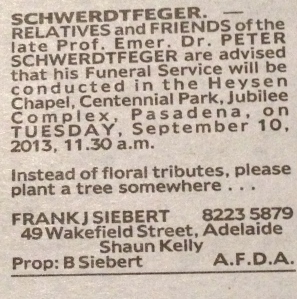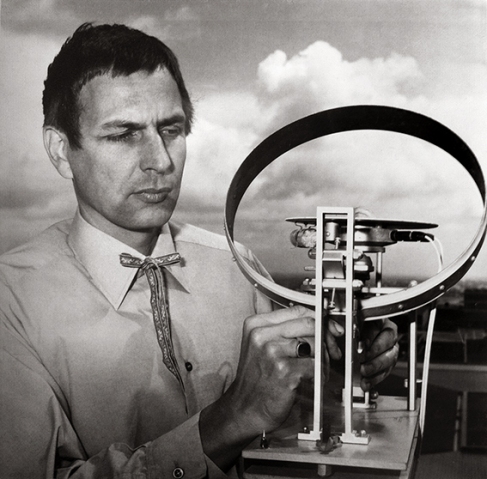
A tough act to follow. Peter was always keen to deliver a comment and a few thoughts to any assembled gathering. It is at just such an occasion as this he would spring to the podium and impart a few words of wisdom if not a lengthy monologue.
So I’ll do my best colour with observations I believe he would appreciate.
Whilst regularly displaying the airs of academic elitism when mixing it with the dreaded university administrators and politicians, his true character, a “Mensch” was exhibited when dealing with his friends, students and members of the broader community . Mensch, a German word which in Yiddish, meaning “a good person”. A fitting use considering his affinity for the Jewish people and his Israeli friends.
His willingness to accept and embrace all is evidenced by a large population of his former students that have settled and achieved success across the globe that not only remained in contact but also close friends and further more in recognition of not only his continued academic status, reciprocated his past generosity with invitations to conferences overseas.
This egalitarian and magnanimous streak was also extended to many of the visitors to our house. It was in the early seventies that Mr Bosisto arrived with his tanker truck to empty the septic tank .
Yes, and upon arrival I believe my father even shook his hand.
Further more, upon completion of said task Mr Bosisto was then invited in for coffee. This could well be dismissed as simply taking advantage of the man in having a captive audience to whom he could show off his shiny new Atomic coffee machine – and we all know of his love of gadgets especially those that made coffee.
But no, I am sure that invitation was an expression of gratitude for a job well done and also an opportunity to satisfy his own inquisitive mind regarding this humble mans own unique history.
An environmentalist, musician, pilot and scientist would well qualify Peter to be described as something of a renaissance man. Another talent, his architectural skills were put to use in the design of the Mt Baw Baw A.N.A.R.E. ski lodge. Together with his Australian National Antarctic Research Expedition colleagues they built this lodge on their weekends in the 1960’s. Maverick perhaps may well have been a more appropriate title considering some of the escapades in the excavation of the earthworks, that being for the septic tank (sorry for the twice referencing septic tanks – but he did enjoy his poo jokes).
When the prescribed number of sticks of dynamite did not satisfy Peter’s impatience for getting the job done the additional number did. A gaping hole in the ground, job well done . On the other hand the flying shrapnel of rocks resulting in a gaping hole in the roof of the neighbouring lodge as well.
A maverick in his ideals.
An uncle recalled many years ago that Peter dismissed Time magazine as an agent of fascist propaganda and American imperialism.
An opponent of the Vietnam war, Nixon, the Iraq war and all the grovelling Australians politicians that followed these misguided causes.
He could see through such frauds with tremendous clarity.
Again university administrators with similarly perverse agendas.
An essential teaching; to question the wisdom of those in authority as it has been shown time and time again that such powers are granted to those with the greater political skills and not rational and humanitarian thinkers.
So, a socialist, admirer of working class (the doing class) and condemning of those sitting behind computers. Yes, again, I am sure you have all endured his rants regarding university administrators.
These ideals were further enhanced once in retirement and introduced to the everyday workings of country life. His admiration for the people toiling outside of the hallowed walls of academia, those that with their innate intelligence and years of acquired skills and knowledge.
A doing class that produced something tangible everyday.
Later in life he did succumb and subscribed to Time magazine.
I can forgive him these indiscretions considering his state of mind. With consideration of the election of our new prime minister he himself understandably today would not have been as forgiving of the Australian voting public.
Considering his own somewhat harsh upbringing I can accept what many would consider his somewhat authoritarian brand of parenting.
Perhaps even dictatorial though definitely benign.
Going against a family tradition of studying the sciences, Peter was still an enthusiastic supporter of India and me following careers within the arts. India studying architecture, followed many years with the arts council and now a sought after teacher of natural dyeing techniques, and myself pursuing a career as a photographer.
Only once did I hear any negativity regarding our career choices and that was at the age of 75 when his illness was well advanced I heard him muttering under his breath “what is this being surrounded by artists and photographers…) well at this point in his life I could well excuse him.
A father may well prefer offspring to follow in his own footsteps though he did well to suppress these thoughts for thirty years.
His grand children were a tremendous source of pride. Lottie with her degree from the VCA, Isa’s amazing culinary skills, Otto’s photographic abilities, Christian’s technical abilities and acceptance to law school, but especially Rosie having achieved a B.Sc. [Hons] in mathematics and Mara, striding forth with her viola.
Mara especially feeling the loss of a grandfather and the number one ticket holder of her fan club.
Peter having travelled several times in recent years to see Mara perform in Sydney.
Apart from all my fathers great achievements there is the
achievement of two parties to be acknowledged, that of both my mother and father in 55 years of marriage.
My father caring for my mother during her many health scares in the last thirty years. Arija then regaining her strength to care for Peter at home in the years leading up to his last year at Burnside Regis.
A stressful time indeed and particularly taxing upon her own health.
It’s the same old story that only in this moment of reflection does one truly appreciate what is now missing.
I will miss the times we spent building a jetty in the dam.
His joy at watching his grand children endlessly running and jumping into the icy water.
I will miss the times he then made pizzas for his grand children’s lunch.
I will miss his fatherly wisdom
I will miss him dearly
KARL SCHWERDTFEGER
